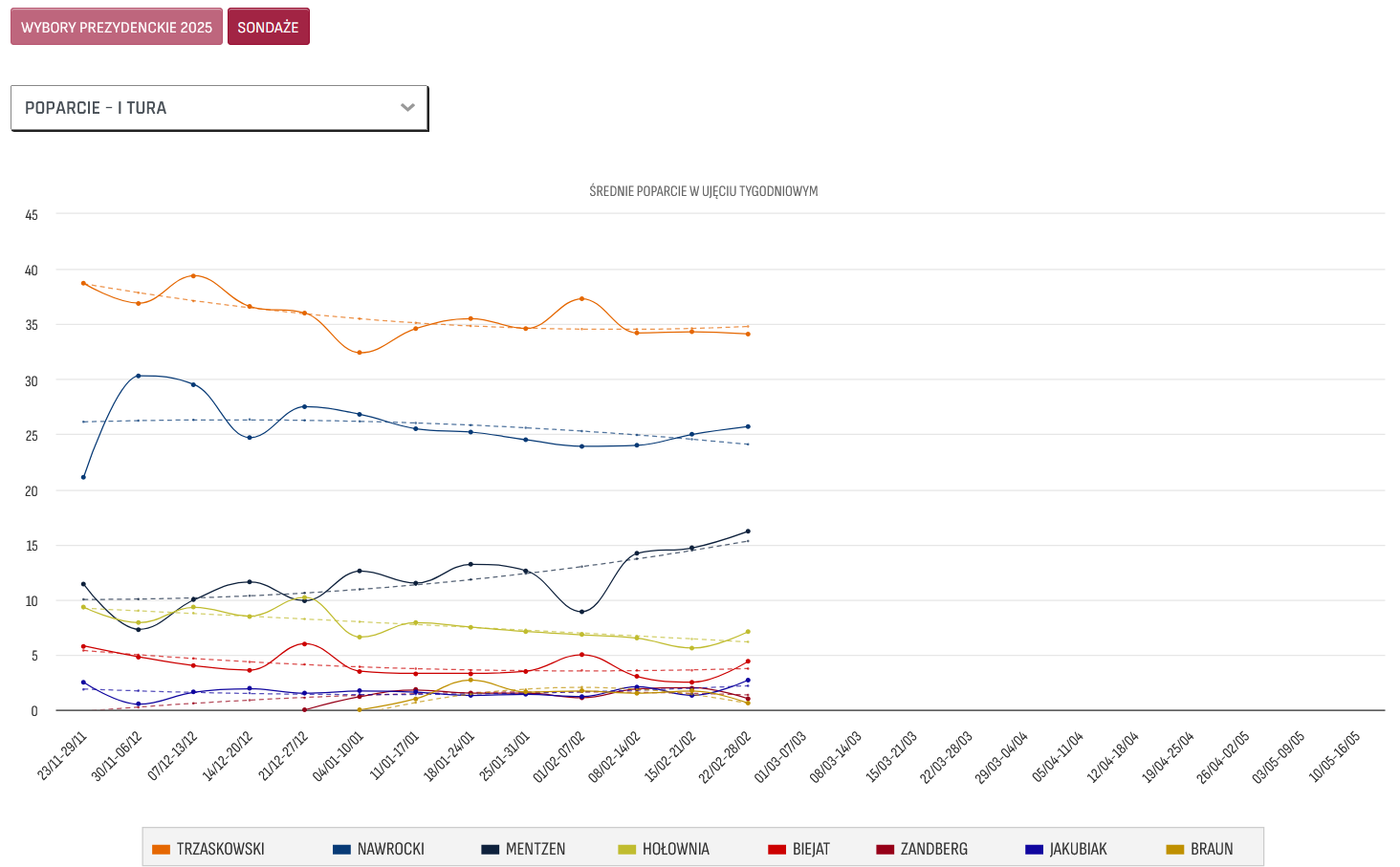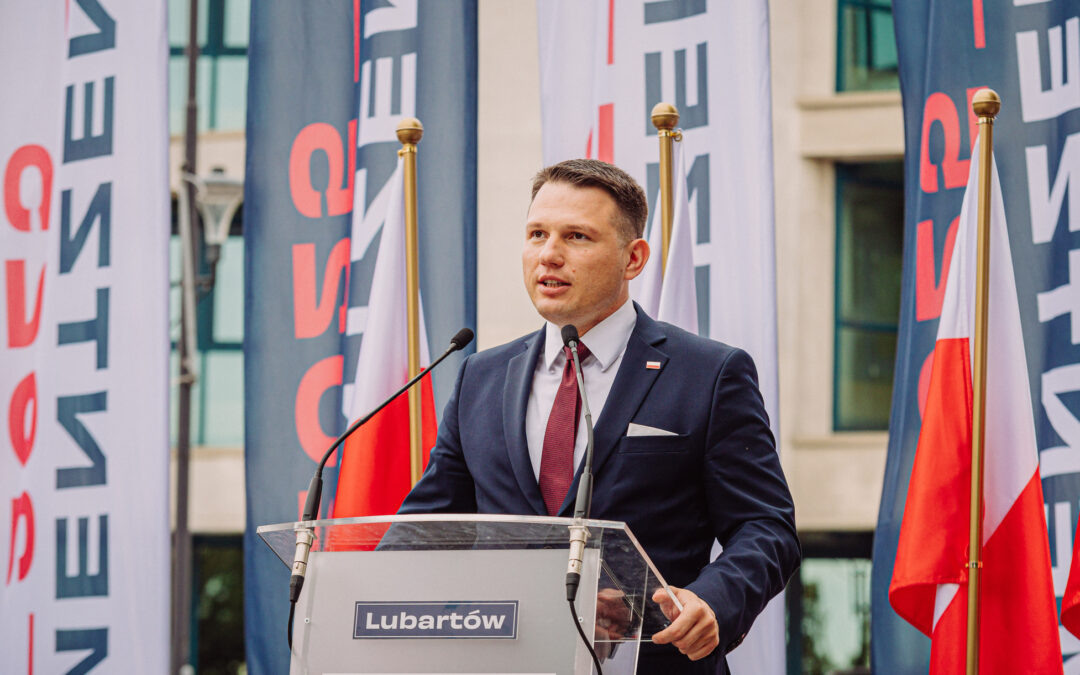Keep our news free from ads and paywalls by making a donation to support our work!

Notes from Poland is run by a small editorial team and is published by an independent, non-profit foundation that is funded through donations from our readers. We cannot do what we do without your support.
By Daniel Tilles
OPINION
Sławomir Mentzen’s rise in the polls reflects an effective campaign and successful efforts to detoxify his party, but also the mainstreaming of his longstanding positions and rhetoric by the two leading candidates.
Poland’s presidential election campaign, which had long looked like a two-horse race, has been transformed by the rise of a third challenger, Sławomir Mentzen of the far-right Confederation (Konfederacja) party.
On Friday, for the first time, a poll put Mentzen in second place, with 18.9% support, behind longstanding frontrunner Rafał Trzaskowski – the candidate of Prime Minister Donald Tusk’s centrist Civic Coalition (KO) – on 33.6%.
Mentzen’s result in the poll, conducted by SW Research for the Wprost weekly, pushed Karol Nawrocki – the candidate supported by the national-conservative Law and Justice (PiS), Poland’s main opposition party – into third place on 16.5%.
One should not, of course, read too much into a single poll. But the latest findings follow a consistent rise in support for Mentzen. At the end of 2024, he was averaging around 10%. That has now risen to just over 16%, according to eWybory, a website that tracks political polling.

Rolling weekly average of support in polls for Poland’s leading presidential candidates (via ewybory.eu)
That still places him well behind Nawrocki, who is averaging almost 26%, and Trzaskowski, on around 34%. But whereas as that pair have seen their support remain fairly stable, Mentzen is the only candidate with clear upward momentum – and there are still two-and-a-half months to go until polling day on 18 May.
If no candidate wins more than 50% of the votes on that day, the top two enter a second-round run-off two weeks later. The question now is whether Mentzen can break into that top two.
Another poll published this week, by United Surveys for the Wirtualna Polska news website, showed Mentzen outperforming Nawrocki in a theoretical run-off against Trzaskowski. Both would lose to the frontrunner, but whereas Nawrocki is 11 percentage points behind Trzaskowski, Mentzen is only seven behind.
However, it should be noted that, ahead of the 2023 parliamentary elections, Confederation was also for a time riding high in the polls, with support of around 13%, before declining in the final weeks of the campaign to finish with just 7% of the vote.
What is behind Mentzen’s rise?
The Confederation candidate has run a professional and active campaign, helping increase his visibility and credibility. His public speeches often draw large crowds, while Mentzen has long been a master of social media. His 1.5 million followers on TikTok is more than any other Polish politician.
According to regular polling by the IBRiS agency for the Onet news website, last November – the month that Mentzen announced his candidacy – 14% of the public did not know who he was. Now that has fallen to just 4%.
Mentzen has also done an effective job of partially detoxifying the Confederation brand by focusing on the business-friendly, economically libertarian aspects of its ideology. Those efforts were aided last month by the expulsion from the party of Grzegorz Braun, one of its leaders, who is renowned for his extremist rhetoric, and in particular for antisemitism.
Braun was thrown out due to declaring his own, unauthorised rival run for the presidency. But the episode was likely welcomed by Mentzen, who had also previously sidelined Janusz Korwin-Mikke, another former Confederation leader known for incendiary remarks.
Braun, who is now a member of the European Parliament, is best known internationally for attacking a celebration of the Jewish festival of Hanukkah in Poland's parliament in 2023 https://t.co/oSMecQMEB4
— Notes from Poland 🇵🇱 (@notesfrompoland) January 16, 2025
Mentzen has also, ironically, probably been helped by the fact that Nawrocki and Trzaskowski have taken positions and used rhetoric that would previously have been more closely associated with Confederation.
Nawrocki has taken a tough line on Ukraine, expressing doubts about its proposed accession to the EU and NATO – something at odds with PiS’s previous strong support for Kyiv’s membership and more in keeping with Confederation’s stance.
This week, Nawrocki echoed Mentzen’s complaints that Ukrainians – Poland’s biggest immigrant group – are putting a strain on Poland’s health system. “Ukrainians should not live better in Poland than Poles,” said Nawrocki, using the kind of language long associated with Confederation.
Nawrocki also this week voiced scepticism about vaccinations, a position long held by Confederation.
A leading candidate in Poland’s presidential election has clashed with a Ukrainian mayor after visiting his city and criticising the presence of a monument to Stepan Bandera, who is seen as a hero by many in Ukraine but regarded as a war criminal in Poland https://t.co/nA9JzMmBcg
— Notes from Poland 🇵🇱 (@notesfrompoland) February 26, 2025
Meanwhile, Trzaskowski has made talking tough on immigration – and in particular on crimes committed by immigrants – a central part of his campaign.
Earlier this month, speaking alongside the interior minister, he announced a “zero tolerance” policy towards foreign criminals. Trzaskowski has also called for social benefits not to be paid to Ukrainians unless they are working and paying taxes.
Such positions, again, reflect longstanding concerns raised by Confederation, which now says that Nawrocki and Trzaskowski’s positions show that they have been right all along.
Poland’s interior minister and the mayor of Warsaw – who is also the main ruling party's presidential candidate – have declared “zero tolerance” for crimes committed by immigrants.
They say foreigners made up 5% of suspected criminals detained last year https://t.co/wnCZqgCsZW
— Notes from Poland 🇵🇱 (@notesfrompoland) February 11, 2025
The two leading candidates have presumably adopted such rhetoric with an eye to the run-off, when they hope to win the votes of those who favoured Mentzen in the first round. But in doing so they risk helping Mentzen himself reach the second round.
For many voters who are motivated by such issues, it makes more sense to vote for a candidate who has long addressed them rather than ones who are seen to have only recently jumped on the bandwagon.
As the National Movement (Ruch Narodowy) – one of the constituent groups that makes up Confederation – wrote on social media this week:
“Mentzen is the original, and Trzaskowski is just imitating his views…Unfortunately (for him [Trzaskowski]), fewer and fewer Poles are deluded that there will be even a trace of these temporarily adopted views after the presidential race is over.”
It also cannot be discounted that the return to office of Donald Trump, whose rhetoric and policies in many areas overlap with those of Confederation, has provided publicity and validation for Mentzen’s positions.
Among the 20 points in Mentzen’s election programme are “no Polish troops in Ukraine”, “sealed borders”, “low taxes”, “stopping leftist ideology”, “rejection of the Green Deal” (an EU climate package), “energy security”, “defending freedom of speech”, and “freeing crytocurrencies“.
Finally, Mentzen is no doubt benefiting from the fact that he offers an alternative to the two parties, PiS and PO, that have led every Polish government since 2005.
Opinion polls have recently shown growing frustration among the public with Donald Tusk’s government, which took power in 2023 and has since then failed to fulfil the vast majority of its pre-election promises. But Poles also previously became disillusioned with eight years of PiS rule.
That allows Mentzen – who, alongside fellow leader Krzysztof Bosak, has reshaped Confederation into a far more serious and professional party – to present himself as the only realistic alternative in a presidential race in which all of the other main candidates are associated with either PiS or Tusk’s coalition.

Notes from Poland is run by a small editorial team and published by an independent, non-profit foundation that is funded through donations from our readers. We cannot do what we do without your support.
Main image credit: CzarneckiRadek/Wikimedia Commons (under CC BY-SA 4.0)

Daniel Tilles is editor-in-chief of Notes from Poland. He has written on Polish affairs for a wide range of publications, including Foreign Policy, POLITICO Europe, EUobserver and Dziennik Gazeta Prawna.



















